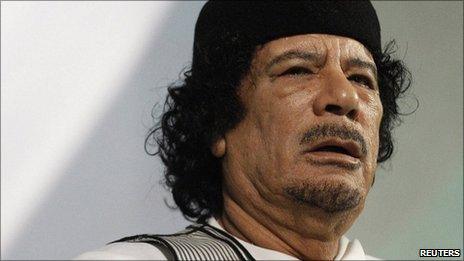Libya: Gaddafi ICC arrest warrant raises questions
- Published
- comments

The announcement by the International Criminal Court's Chief Prosecutor, Luis Moreno-Ocampo, that he's seeking Col Gaddafi's arrest on war crimes charges has come at a critical time.
Nearly two months into NATO's bombing campaign, the conflict is widely seen as a stalemate.
Some hope this legal intervention could help break it.
But it's also triggered charges that the international community is pursuing selective justice, with critics asking why the ICC is not pursuing similar investigations in Syria, Bahrain, or Yemen, where government forces are also accused of widespread atrocities.
The Argentinian prosecutor says he has evidence from witnesses and documents that Col Gaddafi "personally ordered attacks on unarmed Libyan civilians".
He's also seeking the arrest of the Libyan leader's son Saif, and his brother-in-law, the intelligence chief, Abdullah Sanussi, on similar charges.
Isolating Gaddafi
However, the political impact of this case may be more significant.
Western governments and Libyan rebel figures hope the prospect of arrest will further isolate Gaddafi, persuading more of his supporters to defect before they end up on the ICC's list too.
If the Hague-based court's three judges approve the arrest warrant for Col Gaddafi it will be the second time they've gone after a sitting head of state.
Three years ago they approved a warrant for the arrest of Sudan's president, Omar al-Bashir, on genocide charges in relation to Darfur.
But with no police force of its own the court has been unable to detain him, and President Bashir has managed to travel to several African states which don't recognise the ICC.
The same could happen with Col Gaddafi.
Libyan officials dismissed the court even before the ICC prosecutor announced he was seeking his arrest, calling it irrelevant.
They have mocked the court as being a creature of the Europeans which only pursues African leaders and officials.
Double standards?
It's a criticism the ICC has faced before. Its website shows that all its current cases involve African states.
While welcoming the request for Col Gaddafi's arrest, the campaign group Amnesty International raised concerns about double standards, pointedly calling for the international community to pursue justice elsewhere in the Middle East.
It was the United Nations Security Council which initially set the ICC investigation in motion. But it's made no moves in that direction for Bahrain or Syria, despite the brutal tactics their governments have employed in trying to crush their own uprisings.
Yet with NATO facing growing questions over its bombing campaign, some western officials hope the ICC's involvement could help break the deadlock on the ground - regardless of whether Col Gaddafi is ever arrested or even faces trial.
Libyan officials may be more worried by the court than they admit.
The prosecutor's office says it's been receiving calls from unnamed officials offering evidence for the investigation, perhaps hoping to avoid any inquiry themselves or even preparing to switch sides.
But there's also concern the court could complicate matters.
If the current stalemate continues, a negotiated settlement may be the only solution. That's what the International Crisis Group, an influential think tank, is now saying.
That would involve persuading other senior figures in Col Gaddafi's inner circle to talk and then stand down. But they may be not be willing to they face the possibility of future prosecution.